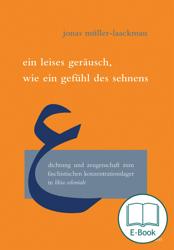Arabic poetry about the Italian concentration camps in Libia Coloniale is often understood primarily as a historical source, thereby neglecting the poems' literary merits. A Soft Sound, Like a Feeling of Longing approaches these poems from a literary theoretical perspective to revive the narratives of trauma and suffering found in concentration camp literature and the Arabic nomadic poetic tradition and to read them anew within Arabic camp literature.
"A soft sound, like a feeling of longing": these are the words a poet uses to describe the sounds of a ship as he and many other deportees are gathered on deck en route to the infamous al-ʿAgīla camp. A portion of the story of the Italian concentration camps in the colony of Libya is told through the poetry about these camps passed down by survivors, which has been archived and partially published in postcolonial Libya.
Historical research on these camps often aims to break away from Eurocentric colonial historiography and confront the myth of Italian fascism as more benign. The collected poems play a central role in this revision by representing original Libyan voices that form a counter-narrative against the European perspective. Yet their literary significance as moving narrations of the suffering in concentration camps often remains unrecognized. There is also little reflection on the implications of the potential trauma of being interned, the sometimes unclear chains of transmission, archival practices, and the understanding of these poems as historical descriptions of factual events.
Against the background of theoretical discussions of the phenomenon of the concentration camp, their potential as sites of trauma, and how European camp literature is dealt with in scholarly and literary debates, the author shows the extent to which these Libyan poems represent much more than mere descriptions of facts and how a critical distance to what is reported does not necessarily mean doubting the credibility of the poets. Rather, the poems represent literary works in the tradition of nomadic poetry; they are Arabic camp literature and thus offer subjective descriptions of suffering and the state of exception in the concentration camp.
Rather than interpreting this poetry as a basis for the formation of an anti-colonial nationalist narrative, the author aims to recognize the poetry as a testimony to suffering. Camp literature as a global phenomenon shows how differently trauma and suffering were and still are negotiated. In this respect, poems about Italian concentration camps are impressive testimonies that, embedded in the Arabic nomadic poetic tradition, show the specific ways in which the poets dealt with their experiences. In this way, first-person perceptions of suffering were captured that can be confronted with European colonial historiography and bias.
Jonas Müller-Laackman, geb. 1987, hat an der Freien Universität Berlin und der Universiteit Leiden Arabistik studiert und wurde mit der vorliegenden Arbeit an der Freien Universität Berlin im Fach Arabistik promoviert. Neben den Forschungsschwerpunkten Trauma und Lagerliteratur ist er im Bereich der Digital Humanities tätig und arbeitet für die Berlin University Alliance an der Erarbeitung von Lösungen für die Forschung mit nicht-lateinischen Schriften.
Literatures in Context is a peer-reviewed book series devoted to Near Eastern and North African literatures. The editors want the title of the series to be understood programmatically. They presuppose a concept of world literature that includes Near Eastern and North African literatures. What is more, they assume that literatures are in many ways marked by intertextuality, that they constitute readings of extremely diverse earlier texts, and that they are posited within a field of tensions, much broader than their respective national language. For the earlier eras of Near Eastern and North African literatures, this field of tensions geographically covers the regions of the Southern and Eastern Mediterranean and Asia Minor. In modern times, it has become a space of interaction that has long since included “global” Western literatures (and realities). This does not imply that the modern Near Eastern and North African literatures have severed themselves from their predecessors. Instead it is precisely the tension between different sets of references in modern Near Eastern and North African literatures, or their “local historical context”, which is a great part of their attraction, that remains a crucial field of research for the modern scholar.


 Table of Contents
Table of Contents